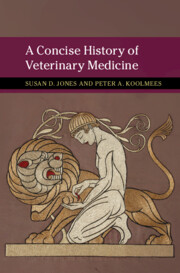Book contents
- A Concise History of Veterinary Medicine
- New Approaches to the History of Science and Medicine
- A Concise History of Veterinary Medicine
- Copyright page
- Contents
- Illustrations
- Tables
- Note on Translations
- Preface
- Introduction
- 1 Animal Healing in Sacred Societies, 1500–1700
- 2 Animal Healing in Trade and Conquest, 1700–1850s
- 3 Formal Education for Animal Healing
- 4 Veterinary Institutions and Animal Plagues, 1800–1900
- 5 Veterinary Medicine in War and Peace, 1900–1960
- 6 Food, Animals, and Veterinary Care in a Changing World, 1960–2000
- 7 Veterinary Medicine and Animal Health, 2000–2020
- Epilogue
- Book part
- Further Reading
- Index
6 - Food, Animals, and Veterinary Care in a Changing World, 1960–2000
Published online by Cambridge University Press: 11 August 2022
- A Concise History of Veterinary Medicine
- New Approaches to the History of Science and Medicine
- A Concise History of Veterinary Medicine
- Copyright page
- Contents
- Illustrations
- Tables
- Note on Translations
- Preface
- Introduction
- 1 Animal Healing in Sacred Societies, 1500–1700
- 2 Animal Healing in Trade and Conquest, 1700–1850s
- 3 Formal Education for Animal Healing
- 4 Veterinary Institutions and Animal Plagues, 1800–1900
- 5 Veterinary Medicine in War and Peace, 1900–1960
- 6 Food, Animals, and Veterinary Care in a Changing World, 1960–2000
- 7 Veterinary Medicine and Animal Health, 2000–2020
- Epilogue
- Book part
- Further Reading
- Index
Summary
In the late twentieth century, the global human population grew dramatically. Global meat production more than doubled as industrial animal production rapidly accelerated. Mechanization, artificial insemination, growth promoters in feed, and disease control contributed to successful "factory farms," while smaller farmers adopted vaccines and antimicrobials. By 2000, 90 percent of the mammals living on earth were humans and their domesticated animals. Veterinarians became "herd health" managers and worked for governments around the world to carry out vaccination programs, provide medications and anthelminthics, and complete inspections and certifications. The OIE and WHO coordinated international campaigns against rinderpest, foot and mouth disease (FMD), and swine fever; but outbreaks of FMD resulted from disagreement over the value of vaccination versus testing. Prion diseases (scrapie and BSE) became major sociopolitical problems after people acquired a form of BSE from infected meat in Britain. Public concerns about food safety, antibiotic resistance, and animal welfare began to challenge intensive livestock production and veterinarians’ role, but most veterinarians in wealthy areas focused on companion animals. By 2000, racial and ethnic diversity in the veterinary workforce was slowly increasing, while the profession rapidly feminized after 1980 in most parts of the world. Responding to client demand, veterinary schools began offering courses in complementary and alternative veterinary medicine (CAVM).
Keywords
- Type
- Chapter
- Information
- A Concise History of Veterinary Medicine , pp. 276 - 328Publisher: Cambridge University PressPrint publication year: 2022

